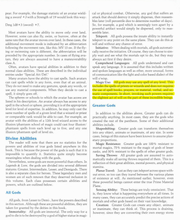Matthew Schroeder said:
"would eventually become" is something I honestly dislike in profiles. Reminds me of the 2-C Zamasu thing because he would "eventually consume the multiverse", and people wanted to give him a 2-C key and put him against other 2-C characters, even though he never reached that level. It's basically a level of power that doesn't exist outside of unfulfilled possibillity.
Here'a the full passage with the important parts highlighted
Approximately one Immortal per 10,000 reaches Full Hierarch status. Most of these beings are content in this exalted post. But some very few Hierarchs have become dissatisfied with their fate. They sought even greater power, and wondered about the paradox of the great barrier. Most of these overcame their concerns and curiosity, but a few—perhaps one of each hundred or two— chose to prove their ultimate superiority, on the remote chance that some greater power might be watching. They dispersed their life essences into their Home Planes, and reincarnated themselves as mere mortal humans once again.
Most of these daring individuals perished in the process, for they indeed became mere mortals, with no better chance to survive and achieve Immortality than any other mortal man. Only a handful both desired and reached Immortal status a second time. And of these, only a few reached Hierarch status a second time.
And finally, of these few, only two dared once again to seek more. They saw the coming of the blackballs as their punishment and final destruction, and the other Immortals still believe that this is what occurred. But unbeknownst to all, they passed beyond the barrier, and exist now with the Old Ones.
One success could have been chance, but the second arrival proved that the great experiment known as the Multiverse would serve its purpose. The Old Ones continue to watch and wait for other daring Hierarchs. And someday when they are satisfied, when their unknown goals have been reached someday the Old Ones will return.
Summary
This set does not attempt to fully describe the Old Ones. We cannot even fully describe their servants, the Immortals, nor their vast realm of the Multiverse. And no future volume will provide details on the Old Ones, for their powers transcend the framework of any mere game. To reduce them to game terms would trivialize their power, which is of an order far greater than the Immortals'.
The Old Ones are prepared to wait indefinitely, for Time has no hold over them.
If any player character succeeds in the great journey, not merely achieving Hierarch status but proving his or her superiority by doing it twice—well, no higher goal can be attained, and no reward is too great. The player wins and his character vanishes. And that is the final end of this game.
So while impossibly hard and rare, it's an achievable form any player can get to.
